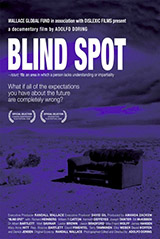Blind Spot Documentary Explore Crucial Issues in Our Time - Movie Review
Video documentary review:
Blind Spot
2008 DVD; 1:24. $16.00 at Film Baby
www.filmbaby.com/films/3368
By Adolfo Doring
Producer: Amanda Zackem
Website: www.blindspotdoc.com

We are very close to a turning point, where life after peak oil will be notably different from how we live life today. As Richard Heinberg succinctly observes in the film documentary Blind Spot, "This is the most serious problem to face the human race - since we've been human."
The film Blind Spot is a fascinating presentation of this event in human history, how we got in our current predicament, why we will need to change, and why we are averse to change. It focuses on our huge population numbers and our relationship to the earth. It considers our increasing demand for oil at a point where supplies are about to diminish, and how increasingly abundant cheap energy has led us to our current predicament.
Blind Spot begins - and concludes - with the sobering statement
The world is saying, "either you can fix it or I can fix it, and if I fix it you are not going to like it because I'm going to throw everything away." And everything means most of us.
The film contains a rich tapestry of interwoven visual images and commentary and is decidedly not stilted, boring or dry. It presents facts, yet only three charts are briefly shown. Tone and pacing are excellent. Absent the boring monotone of a single narrator, this documentary interleaves statements of notable environmentalists and scientists - which alone make it worth watching more than once. Interviewees include Albert Bartlett, William Catton Jr., Derrick Jensen, Max Fraad Wolff, David Pimentel, Kenneth Deffeyes, Joseph Tainter, Terry Tamminen, Jason Bradford, Elke Weber, James Hansen, Mary Anne Hitt, Rep. Roscoe Bartlett, Bill McKibben, David Korten, Matt Savinar, and Lester Brown.
The film calls attention to the fact that increasing energy use is the key to understanding the last 200 years of history. Abundant energy has allowed us to construct a paradigm where we believe that growth is normal and can continue forever. We believe fundamental "truths" without question: that oil will last indefinitely, population growth is not an issue, technological fixes will solve all our problems, and our current system of investment creates real wealth.
Lester Brown comments: "I think the world of declining oil production will be so different from the one of rising oil production and oil use that we'll hardly recognize it. It's going to change almost everything we do - every facet of our lives... There's been a public information campaign to discourage the world from gearing up and seriously preparing for a world in which oil production will be declining."
Prof. Al Bartlett: "In general, people are innumerate - which is the mathematical equivalent of illiteracy... If we don't stop population growth, nature will."1
Jabon Bradford: "We have developed a culture that reinforces the idea that we can always get more... All anyone who's alive today can see is this era of human progress and then assume it is going to stretch out to the future." Yet most of our major assumptions are false. Challengers of the existing paradigm are "...challenging generations of beliefs and assumptions. Those who challenge it are essentially putting themselves outside of their own culture."
The film focuses on why we are in our current predicament. We may be dimly aware of the critical issues of overpopulation and peak oil, yet we conduct business as usual. Elected political leaders avoid even a mention of them. We seem to be living in a detached world, out of touch with the reality of our future.
William Catton notes that "Preoccupation with routines of life prevents people from thinking about [the issue]... We have been through a period of history in which expansion was tantamount to progress."
Elke Weber insightfully observes: "People are incredibly impatient and favor immediate consumption.... So a blind spot is something to which we don't pay attention because it is often times removed from us, either in time or in space, and therefore doesn't threaten us in any immediate way."
What kind of future do we want for our species - and for all species? If we can't have infinite growth on a finite planet, can we re-examine our beliefs and our way of life in sufficient depth in order to construct a sustainable world?
James Hansen asks: "So the question is: do we want to preserve the planet that resembles the one we inherited from our ancestors?"
David Korten: "This is a fundamental rethinking of what it means to be human."
Blind Spot is indeed worth watching - not only by those who are familiar with the issues of overpopulation and peak oil but especially by those who know little about them. The appealing visual imagery of this informative documentary is mesmerising and perfectly complements the speaker's comments. This film draws one back for repeated viewings and enduring reflection.
The film certainly has a forceful impact by the direct manner in which it addresses the serious problems we now face. Yet it also offers hope by showing that serious people are earnestly considering these problems and that others are invited to join the dialog.
The film makes no hysterical and alienating cry for action, yet leaves one with a deep understanding of why we have little choice but to take action. Very well done.
Endnotes
1. View segments of the video at Al Bartlett - Interviews and at www.blindspotdoc.com.
